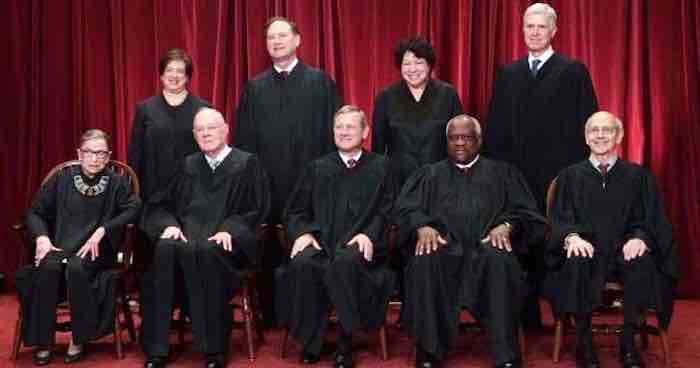By Dan Calabrese ——Bio and Archives--December 27, 2017
American Politics, News | CFP Comments | Reader Friendly | Subscribe | Email Us
 It's become a sadly predictable spectacle: President Trump issues an executive order that's fully within his authority, but is deeply disliked by liberals. Liberals run to court, seeking an Obama-, Clinton- or Carter-appointed federal judge who is willing to ignore the limits of his or her own authority and issue an order against the Trump action. The result is often months of legal positioning between the Justice Department and the plaintiffs, all just to establish that the president of the United States is legally permitted to govern.
Ordinarily this would not be a controversial proposition. But because the president is Donald Trump, and because left-wing federal judges are increasingly willing to issue orders they have no legal authority to issue, we end up having court battles over every little thing - until it ultimately ends up being decided by the Supreme Court.
It's become a sadly predictable spectacle: President Trump issues an executive order that's fully within his authority, but is deeply disliked by liberals. Liberals run to court, seeking an Obama-, Clinton- or Carter-appointed federal judge who is willing to ignore the limits of his or her own authority and issue an order against the Trump action. The result is often months of legal positioning between the Justice Department and the plaintiffs, all just to establish that the president of the United States is legally permitted to govern.
Ordinarily this would not be a controversial proposition. But because the president is Donald Trump, and because left-wing federal judges are increasingly willing to issue orders they have no legal authority to issue, we end up having court battles over every little thing - until it ultimately ends up being decided by the Supreme Court.
DACA provided a period of deferred action (a promise that the alien would not be deported) as well as access to certain government benefits (including work authorizations, Medicare, Social Security, and the earned income tax credit). The period of deferred action was initially for two years, but that period was extended to three years by a second DHS memorandum on Nov. 14, 2014. The Trump administration took a different approach. On Sept. 5, then-acting DHS Secretary Elaine Duke issued a new memorandum terminating the DACA program and all benefits provided under it effective March 18, 2018, unless President Donald Trump provides another extension of the program or Congress passes a bill addressing the issue. The acting secretary stated that her determination was based in part on the attorney general’s conclusion that DACA was unlawful and likely would be enjoined in potentially imminent litigation. Shortly thereafter, the administration found itself in a legal battle. Five related lawsuits challenging the acting secretary’s Sept. 5 determination were filed in a federal district lower court in California. The suits argued that the determination violated the Administrative Procedure Act (which governs the way in which federal administrative agencies may propose and establish regulations), and denied affected aliens due process and equal protection under the law.
On Oct. 17, the district court issued an order accepting plaintiffs’ contention that the 256-page record DHS used to support its Sept. 5 determination was “incomplete.” In so doing, the court imposed an enormous burden on the government, ordering it to turn over all “emails, letters, memoranda, notes, media items, opinions and other materials” that fell into several broad categories. The Justice Department unsuccessfully challenged this ruling before the largely liberal 9th U.S. Circuit Court of Appeals, and then appealed to the Supreme Court. In its short unsigned opinion, the Supreme Court held that, before imposing its heavy-handed documentary request, the district court first should have ruled on the government’s two “serious” threshold arguments—that the decision to terminate DACA was unreviewable under the Administrative Procedure Act because it was “committed to agency discretion,” and that the Immigration and Nationality Act deprived the lower court of jurisdiction.This is not a final ruling on the case, and the Supremes could theoretically come back later and rule in favor of the plaintiffs. But the merits of the case and the SCOTUS pattern on such cases to date suggests this is unlikely. In order to rule against the Trump Administration on this, the Court would have to find that President Trump lacks the authority to simply enforce the law as written. It would further have to find that an executive order of one president directing the bureaucracy not to enforce statutory law trumps the statute itself. In other words, the Supremes would have to rule that once a president decides to refuse enforcement of an existing law, no future president can come back and resume enforcement of that law. The Supreme Court is not going to do that. But it continues to astound that so many lower-level federal judges are willing to issue such rulings, which is why it's so important that President Trump and Senate Republicans are making so much progress in appointing conservative judges to the federal bench wherever there are vacancies. In addition to Neil Gorsuch on the Supreme Court, Trump has appointed 19 judges at the Court of Appeals level and 48 at the District Court level. Many have already been confirmed, and the Senate is moving quickly on those still needing confirmatio
Support Canada Free Press

View Comments
Dan Calabrese’s column is distributed by HermanCain.com, which can be found at HermanCain
Follow all of Dan’s work, including his series of Christian spiritual warfare novels, by liking his page on Facebook.